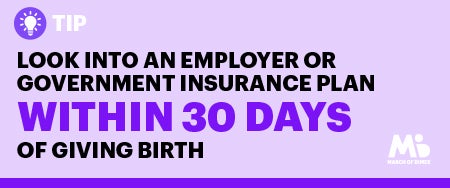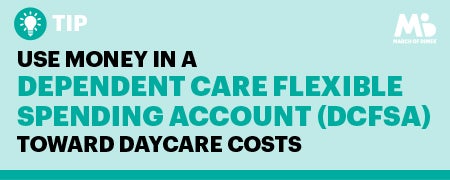Having a baby isn’t cheap, so it’s wise to budget for all the costs heading your way. Think about everything you need to buy on a regular basis, plus one-time purchases and long-term expenses that come with a growing baby.
Ongoing Costs
- Diapers
- Bottles
- Wipe
- Clothes
One-Time Purchases
- Car seat
- High chair
- Crib
- Stroller
Long-Term Costs
- Childcare
- Education
- Insurance
- Hobbies
Start financial planning now
Claim your child as a dependent.
File a new W-4 form with your employer (or your partner’s employer) within ten days of your baby’s birth so you can claim them as a dependent. This can lower how much money you pay in taxes.
Draft a baby budget.
Diapers, bottles, wipes, oh my. Babies come with a lot of “stuff,” so it’s wise to create a baby budget to track where and how you’re spending your money. Having a plan in place lets you see potential areas where you can save and costs you didn’t expect. Look for a baby cost calculator online to help you work out expenses for the first year. Include regular, ongoing costs and one-off purchases, and make sure to account for how your income may change during this time period.
Start collecting baby gear.
A good crib and car seat are important to have, so compare different ones and look at reviews. It’s also a good idea to check recall information for any baby gear you buy to make sure there are no faulty parts or other issues. The United States Consumer Product Safety Commission (CPSC) lets you search by category to find recalled products.
Consider long-term expenses
Put a will in place.
A will is a legal document that spells out your wishes in case something happens to you. This includes naming a person to care for your baby. While it may be upsetting to think about this right now, creating a will is one of the most important things you can do for your family. The best part is you don’t need a lawyer to create a will—you can do it yourself online at a site like LegalZoom.com.

Start saving for your baby’s future.
Open a bank account for your baby. (Many banks let you open an account with $25.) Then, when a birthday or holiday rolls around, ask friends and family to make deposits into your baby’s savings account. Most states offer 529 education college savings plans that come with a lot of tax benefits. Talk to someone at the bank for more information.
Wrap your head around health insurance.
If you (or your partner) have a health insurance plan through work, add your baby to the plan within thirty days of their birth. You can also look into affordable plans at healthcare.gov or see if you qualify for Children’s Health Insurance Program (CHIP).

Plan for daycare costs.
If you need childcare, start thinking about options as soon as your baby is born. Some possibilities include daycare centers, in-home childcare or even a family member. Costs vary depending on your choice, so consider your baby’s needs and what you can afford.
Check your work benefits.
If you work for a company that lets you put money from your paycheck into a Flexible Spending Account (FSA) or Health Savings Account (HSA), put in the maximum amount you can. Money in these types of accounts isn’t taxed and can be spent on a lot of different costs, like doctor co-pays and insurance deductibles.

Pay off debt where you can.
The interest on your credit cards adds up quickly, so it’s a good idea to pay off your credit card bill each month if possible. Then, put the money you would have spent on interest into a savings account.
Buy life insurance.
With a life insurance policy, you make monthly payments in return for a guarantee that your loved ones (named in the policy) will get a lump sum of money in the event of your death. The younger and healthier you are, the cheaper life insurance usually costs. Speak with an insurance agent to see if this is something you can afford right now.
Download our To Do list of important legal steps you should take as soon as your baby is born.